Top Rankings
Mill A School District ranks among the top 20% of public school district in Washington for:
Category
Attribute
Student Attention
Lowest student:teacher ratio (Top 1%)
For the 2025 school year, there is 1 public high school serving 26 students in Mill A School District.
Public High Schools in Mill A School District have a diversity score of 0.15, which is less than the Washington public high school average of 0.68.
Minority enrollment is 8% of the student body (majority Hispanic), which is less than the Washington public high school average of 50% (majority Hispanic).
Overview
This School District
This State (WA)
# Schools
2 Schools
862 Schools
# Students
72 Students
392,615 Students
# Teachers
10 Teachers
19,037 Teachers
Student : Teacher Ratio
7:1
7:1
District Rank
Mill A School District, which is ranked within the bottom 50% of all 306 school districts in Washington (based off of combined math and reading proficiency testing data) for the 2021-2022 school year.
Overall District Rank
#174 out of 307 school districts
(Bottom 50%)
(Bottom 50%)
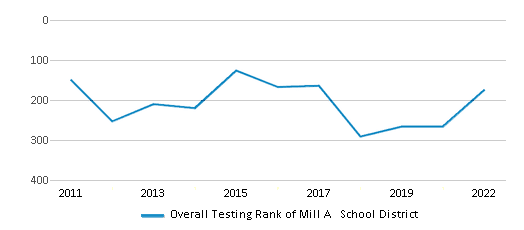
Math Test Scores (% Proficient)
21-39%
40%
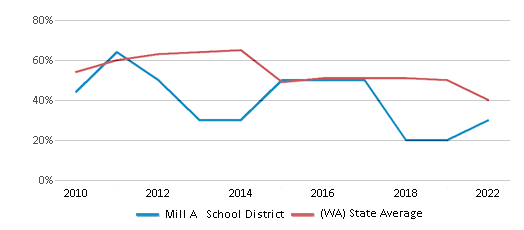
Reading/Language Arts Test Scores (% Proficient)
40-59%
53%
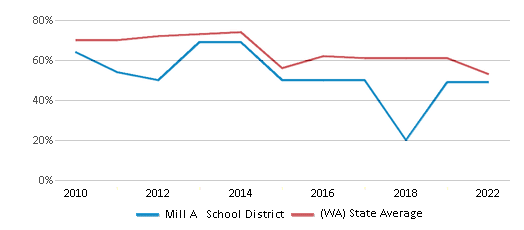
Science Test Scores (% Proficient)
≥50%
49%
Students by Ethnicity:
Diversity Score
0.25
0.68
# American Indian Students
n/a
6,222 Students
% American Indian Students
n/a
2%
# Asian Students
n/a
31,721 Students
% Asian Students
n/a
8%
# Hispanic Students
5 Students
98,262 Students
% Hispanic Students
7%
26%
# Black Students
n/a
18,031 Students
% Black Students
n/a
5%
# White Students
62 Students
191,731 Students
% White Students
86%
50%
# Hawaiian Students
2 Students
5,281 Students
% Hawaiian Students
3%
1%
# Two or more races Students
3 Students
32,269 Students
% of Two or more races Students
4%
8%
Students by Grade:
# Students in PK Grade:
-
1,298
# Students in K Grade:
5
1,800
# Students in 1st Grade:
6
1,949
# Students in 2nd Grade:
4
2,043
# Students in 3rd Grade:
4
2,225
# Students in 4th Grade:
6
2,376
# Students in 5th Grade:
8
2,423
# Students in 6th Grade:
7
4,808
# Students in 7th Grade:
6
8,534
# Students in 8th Grade:
3
10,258
# Students in 9th Grade:
5
86,766
# Students in 10th Grade:
7
88,756
# Students in 11th Grade:
11
87,586
# Students in 12th Grade:
-
91,793
# Ungraded Students:
-
-
District Revenue and Spending
The revenue/student of $31,125 is higher than the state median of $18,796. The school district revenue/student has declined by 13% over four school years.
The school district's spending/student of $32,611 is higher than the state median of $19,246. The school district spending/student has declined by 13% over four school years.
Total Revenue
$2 MM
$20,715 MM
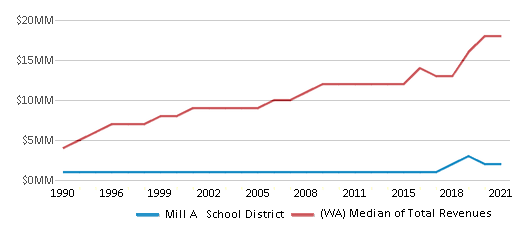
Spending
$2 MM
$21,212 MM
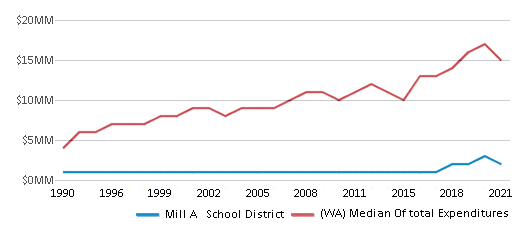
Revenue / Student
$31,125
$18,796
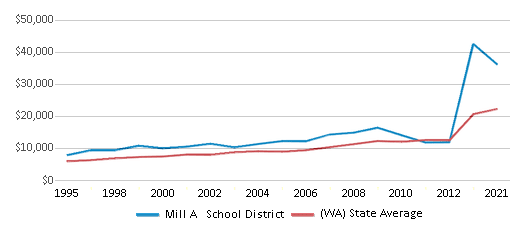
Spending / Student
$32,611
$19,246
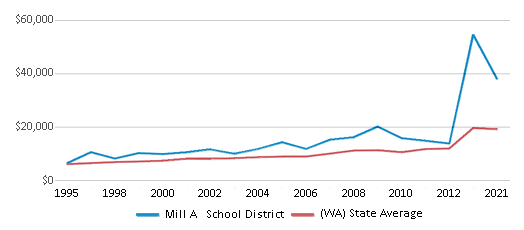
Best Mill A School District Public High Schools (2025)
School
(Math and Reading Proficiency)
(Math and Reading Proficiency)
Location
Grades
Students
Rank: n/an/a
Pacific Crest Innovation Academy
Magnet School
1142 Jessup Rd
Bingen, WA 98605
(509) 538-2522
Bingen, WA 98605
(509) 538-2522
Grades: 8-12
| 26 students
Recent Articles

Sexual Harassment at Age 6: The Tale of a First Grade Suspension
A six-year old in Aurora, Colorado, was suspended after singing an LMFAO song to a little girl in his class and reportedly “shaking his booty.” We look at the case and the sexual harassment problem in public schools today.

How Scaffolding Could Change the Way Your Child Learns
This article explores the concept of instructional scaffolding, a teaching method that enhances learning by breaking down complex tasks into manageable parts. It highlights how scaffolding supports students in developing critical thinking skills and becoming more independent learners. The article discusses the benefits of scaffolding, including improved engagement and reduced anxiety, and provides strategies for its implementation across various educational levels.

February 05, 2025
Understanding the U.S. Department of Education: Structure, Impact, and EvolutionWe explore how the Department of Education shapes American education, from its cabinet-level leadership to its impact on millions of students, written for general audiences seeking clarity on this vital institution.





